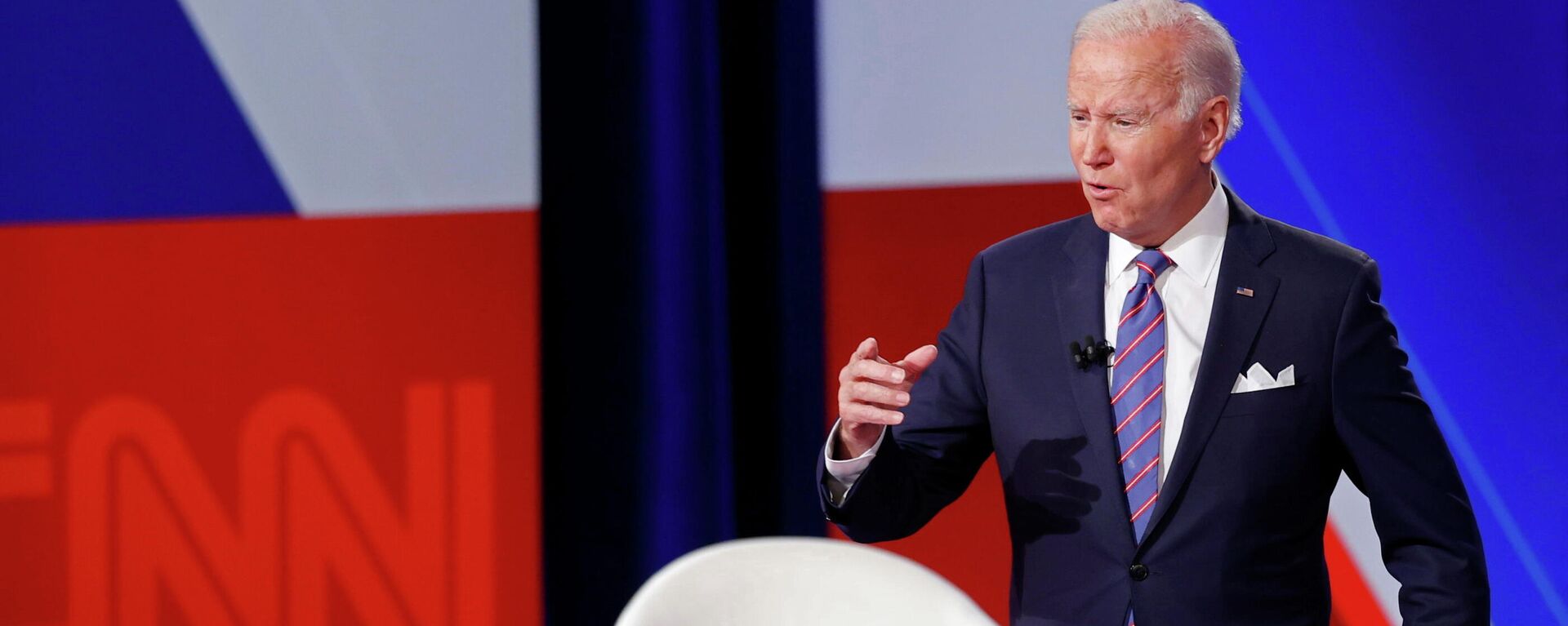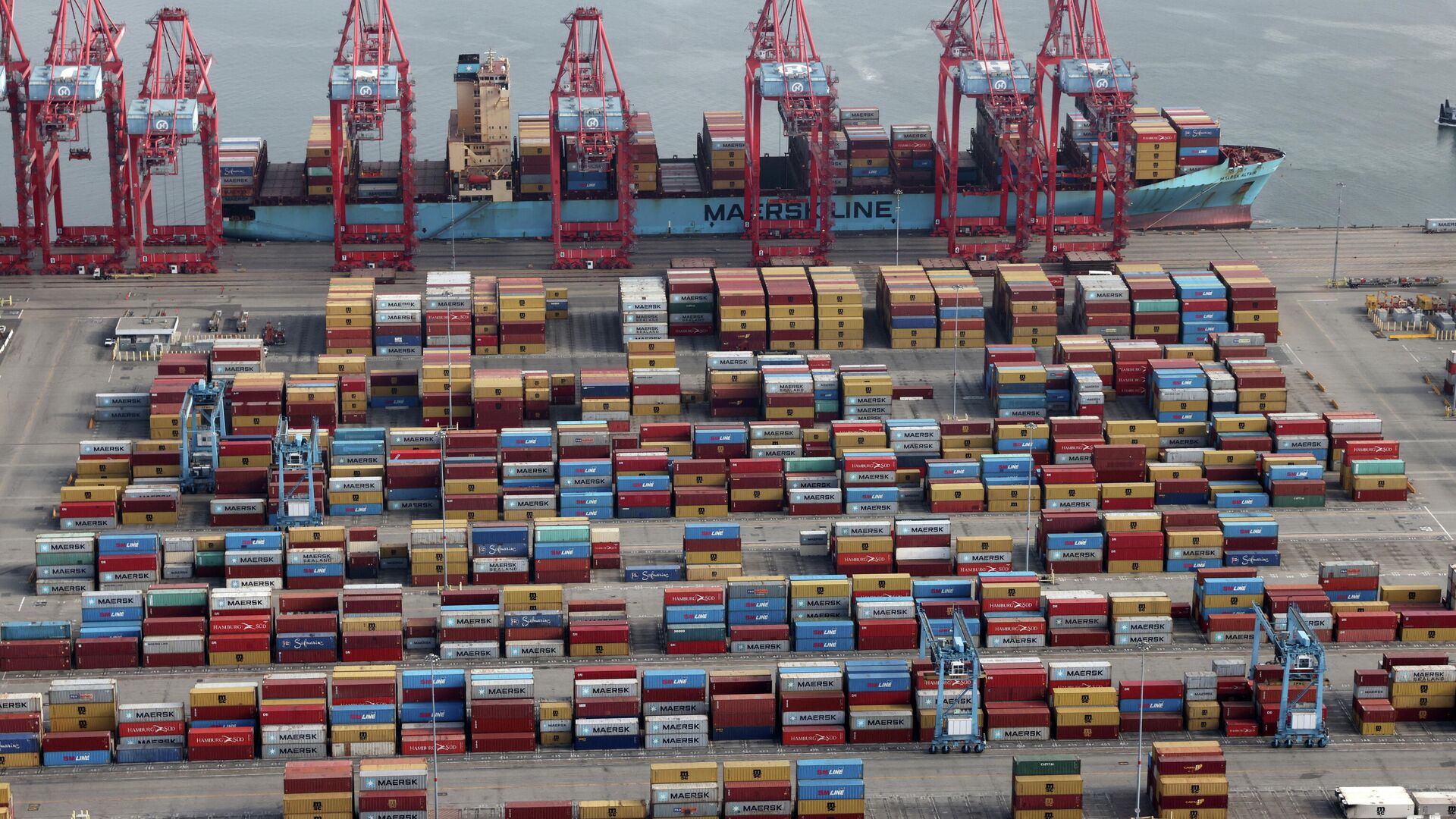https://sputnikglobe.com/20211022/white-house-in-damage-control-mode-as-biden-suggests-using-national-guard-to-solve-supply-chain-1090142255.html
White House in Damage Control Mode as Biden Suggests Using National Guard to Solve Supply Chain Woes
White House in Damage Control Mode as Biden Suggests Using National Guard to Solve Supply Chain Woes
Sputnik International
The Biden administration has faced growing criticism of its handling of the supply chain crisis facing the country, which has left dozens of ships waiting to... 22.10.2021, Sputnik International
2021-10-22T17:40+0000
2021-10-22T17:40+0000
2021-10-22T18:22+0000
joe biden
white house
crisis
supply chain
https://cdn1.img.sputnikglobe.com/img/07e5/0a/0d/1089898352_0:244:3071:1971_1920x0_80_0_0_3c91b25b12ec3dd488eea8bfa2d2618b.jpg
A White House official has backpeddled on President Joe Biden’s comments on using the National Guard to deal with the supply chain crisis, telling CNN that “requesting the use of the National Guard at the state level” was “under the purview of governors,” and that “we are not actively pursuing the use of the National Guard on the federal level.”Earlier, at a CNN town hall, Biden told moderator Anderson Cooper that he would “absolutely, positively” call on the National Guard if necessary to solve America’s supply chain crisis.“But in addition to that what you gotta do is you gotta get these ships in and unloaded. And one of the things in my infrastructure plan – there’s $16 billion for port expansion. We have to be able to move things along, because what’s happening is, when we – a product your mother may need for interior design in terms of drapery or colours or something that is imported from somewhere else, well guess what? A lot of these places, particularly in South Asia are closing down because of Covid. The businesses are just flat closing,” Biden said.The president stressed that his priority was to “get the ports up and running, and get the railroads and the railheads and the trucks in port ready to move because I’ve gotten Walmart and others to say we’re gonna move stuff off of the port into our warehouses.”“The whole point is, we’ve gotta get to small business as well because the big guys are in trouble, and a lot of the product that your mother makes, the things she does in interior design building, the material, she buys from the larger outfits, I assume, I don’t know that,” Biden added.The Biden administration has faced growing criticism over its handling of the supply chain crisis, with 160 Republicans signing a letter to the president this week urging him to address the issue before considering new multi-trillion dollar spending, and the hashtag #EmptyShelvesJoe trending on Twitter.The crisis has been blamed on a combination of factors, ranging from transportation secretary Buttigieg’s decision to go on paternity leave in the middle of the crisis, to labour shortages, surging demand for goods amid a global recovery from the COVID crisis, extreme weather, electricity outages in Asia, and more.The administration has pushed the ports at Los Angeles and Long Beach, which account for as much as 40 percent of US imports, to operate 24/7 to alleviate bottlenecks, but has generally limited state intervention in an sector ordinarily fielded by business. Washington expects the situation to last through the holiday season, with some retailers worried that it could last “well into next year,” and possibly even “years” into the future.Last week, Economic Policy Institute senior economist Rob Scott told Sputnik that a big part of the problem was the overvalued dollar and a failure by America’s leaders to make domestic products more competitive against imports over the years.
https://sputnikglobe.com/20211022/biden-at-town-hall-addresses-gas-price-supply-chain-crises-vows-to-defend-taiwan-1090122223.html
white house
Sputnik International
feedback@sputniknews.com
+74956456601
MIA „Rosiya Segodnya“
2021
News
en_EN
Sputnik International
feedback@sputniknews.com
+74956456601
MIA „Rosiya Segodnya“
Sputnik International
feedback@sputniknews.com
+74956456601
MIA „Rosiya Segodnya“
joe biden, white house, crisis, supply chain
joe biden, white house, crisis, supply chain
White House in Damage Control Mode as Biden Suggests Using National Guard to Solve Supply Chain Woes
17:40 GMT 22.10.2021 (Updated: 18:22 GMT 22.10.2021) The Biden administration has faced growing criticism of its handling of the supply chain crisis facing the country, which has left dozens of ships waiting to unload tens of thousands of containers-worth of goods ranging from apparel to food at ports.
A White House official has backpeddled on President Joe Biden’s comments on using the National Guard to deal with the supply chain crisis,
telling CNN that “requesting the use of the National Guard at the state level” was “under the purview of governors,” and that “we are not actively pursuing the use of the National Guard on the federal level.”
Earlier, at a CNN town hall, Biden told moderator Anderson Cooper that he would “absolutely, positively” call on the National Guard if necessary to solve America’s supply chain crisis.
“But in addition to that what you gotta do is you gotta get these ships in and unloaded. And one of the things in my infrastructure plan – there’s $16 billion for port expansion. We have to be able to move things along, because what’s happening is, when we – a product your mother may need for interior design in terms of drapery or colours or something that is imported from somewhere else, well guess what? A lot of these places, particularly in South Asia are closing down because of Covid. The businesses are just flat closing,” Biden said.
“The answer is, ‘yes,’ if we can’t move, increase the number of truckers, which we are in a process of doing, [the National Guard would be called in],” Biden clarified.
The president stressed that his priority was to “get the ports up and running, and get the railroads and the railheads and the trucks in port ready to move because I’ve gotten Walmart and others to say we’re gonna move stuff off of the port into our warehouses.”
“The whole point is, we’ve gotta get to small business as well because the big guys are in trouble, and a lot of the product that your mother makes, the things she does in interior design building, the material, she buys from the larger outfits, I assume, I don’t know that,” Biden added.

22 October 2021, 06:06 GMT
The Biden administration has faced growing criticism over its handling of the supply chain crisis, with 160 Republicans signing a
letter to the president this week urging him to address the issue before considering new multi-trillion dollar spending, and the hashtag
#EmptyShelvesJoe trending on Twitter.
The crisis has been blamed on a combination of factors, ranging from transportation secretary Buttigieg’s decision
to go on paternity leave in the middle of the crisis, to labour shortages, surging demand for goods amid a global recovery from the COVID crisis, extreme weather, electricity outages in Asia, and more.
The administration has pushed the ports at Los Angeles and Long Beach, which account for as much as 40 percent of US imports,
to operate 24/7 to alleviate bottlenecks, but has generally limited state intervention in an sector ordinarily fielded by business. Washington expects the situation to last through the holiday season, with some retailers worried that it could last
“well into next year,” and possibly even
“years” into the future.
Last week, Economic Policy Institute senior economist Rob Scott
told Sputnik that a big part of the problem was the overvalued dollar and a failure by America’s leaders to make domestic products more competitive against imports over the years.




